Gypsy heard plans for cultural policy before

National Carnival Commission (NCC) chairman and calypsonian Winston “Gypsy” Peters called on the calypso fraternity and the those in authority for their comments not to be vacuous as in the past.
His comments come after Minister of Tourism, Culture and the Arts Randall Mitchell said a cultural policy was being implemented which would ensure that artistes are appreciated for their work. Mitchell said the policy, which was laid in Parliament last year, seeks to facilitate “a thriving, inclusive and dynamic cultural environment.”
The comments were made at the cultural farewell for the late calypsonian Sandra “Singing Sandra” Des Vignes Millington on Wednesday at the Queen’s Hall, Port of Spain.
It was a star-studded event which saw people like Austin “SuperBlue” Lyons, Michael “Sugar Aloes” Osuna and reigning Calypso Monarch Terri Lyons in attendance.
In his tribute and address Gypsy said he was happy to see so many members of the calypso fraternity there, as well as those in authority.
He said as they celebrated the life of Singing Sandra, the fraternity was happy and saddened. It was happy to see so many of its practitioners gathered to speak eloquently to the greatness of the person in the coffin.
But he asked his fellow calypsonians, “Where were we all the time?
“Why our absence in the lives of so many of the people who have done so much for our country when they need us most? In a lot of ways we can speak individually of the things we have done, but can we do that collectively?
“The short answer is no.”
Gypsy told Mitchell he appreciated and liked what he had said, but that was not the first time he was hearing something like that.
“I have been in this business for over 50 years and I have been hearing that for longer than that.
“All of the things we are going to do for the fraternity – and it is always said on occasions like these, when the person lying in the coffin and our emotions run high, and their significance (is) multiplied in (such) a way that we extol their virtues and talk about all the things we are going to do.
“Have we done it, and if not, what has prevented us from doing it all these years?”
Gypsy said the calypso fraternity has done yeoman service for TT and continues to do so.
He asked his colleagues and those present for their comments not to be vacuous as they were in the past.
“Let us add some significance to what you are saying, what you have said, so that we, the people who would be the beneficiaries, would say, ‘Yes, here goes some politicians who actually say something and mean it, or say something and do it.’”
Asked about Gypsy’s comments after the farewell, Mitchell said they took him by surprise, “Since he, as a member of the United National Congress (UNC), was a part of the People’s Partnership Government during 2010-2015 and also served as a minister of culture during that tenure, and put absolutely nothing in place to recognise the cultural achievements of those outstanding persons in the cultural arena.”
Mitchell said he got a “sense of hypocrisy” from Gypsy’s comments, but he knew Gypsy might be grieving the death of an icon.
He added he was given the honour to serve as minister with responsibility for culture by the Prime Minister and within a few months, laid the National Cultural Recognition Policy in the Parliament.
“This policy had been worked on by a committed team under the former minister and approved by the Cabinet led by our Honourable Prime Minister. The policy was developed following an acknowledgement of the need to recognise excellence in the culture, cultural legends, and cultural ambassadors.”
He said it was only under the People’s National Movement administration beginning in 2015 and continuing now that the void was acknowledged and “is now putting mechanisms in place to honour our cultural icons.”
In his address Mitchell said the implementation of the policy would be pursued through institutional arrangements designed in a genuine partnership between the Government and the cultural community.

Comments
"Gypsy heard plans for cultural policy before"